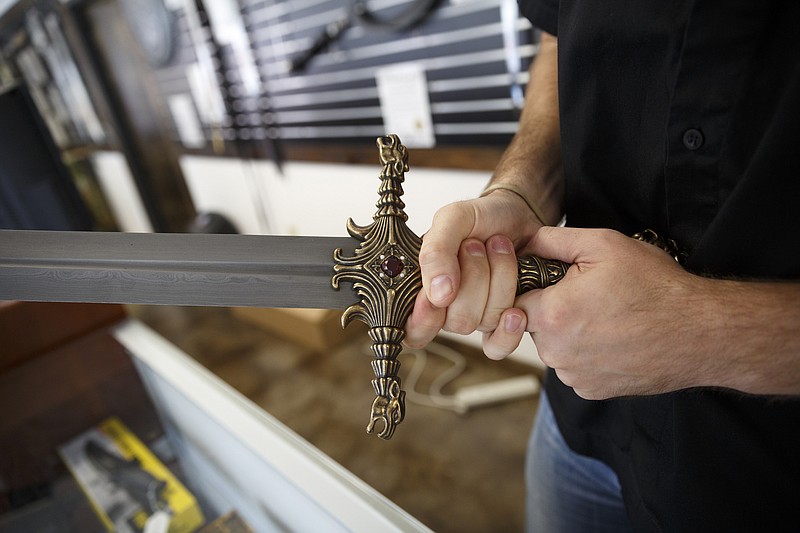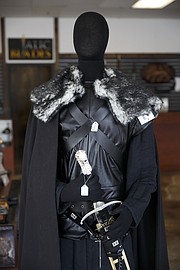Photo Gallery
Game of Thrones' official sword vendor moves to Red Bank while sword wholesaler marks 30 years in Sale Creek
Chattanooga is known for many things, from being the inspiration for the swing band hit "Chattanooga Choo Choo" to giving the world the MoonPie.
Add swords to the list.
Red Bank is the new home for Jalic Blades, which has the license to make the official, collectible swords for George R.R. Martin's wildly popular medieval fantasy book series "A Song of Ice and Fire," and the HBO TV series "Game of Thrones." The swords retail from around $200 to $300.
"I was into 'Game of Thrones' before it was cool," said Chris Beasley, the owner of Jalic (shorthand for "just a little Internet company") who recently relocated his business from the East Lansing, Mich., to a warehouse and retail space at 2011 Dayton Boulevard in Red Bank.
Meanwhile, a 30th anniversary will be celebrated this year by CAS Iberia, a business in a Sale Creek warehouse that quietly has become one of the nation's largest wholesalers of swords, in particular, samurai swords. Its founder, Barry Ross, was one of the first to import samurai swords from China that are made in the traditional method like those from Japan - which are almost impossible to get because Japan limits samurai sword production.
Until Ross started importing good samurai swords to the United States, those sold here were generally only for display, or SLOs, "sword-like objects," joked Blake Pogue, CAS Iberia's head of product development and marketing.
"At that time, nobody was doing functional stuff," Pogue said.
Being a nerd pays off
Beasley started to sell collectible swords online early in life and had quick success.
The business' roots go back to 1999, when Beasley was a freshman majoring in genetics and computer science at Michigan State University.
"Jurassic Park had done it for me for wanting to get into genetics," said Beasley, who found a job doing research and website work for a genetics lab on campus.
While the Steven Spielberg film about the wildlife park full of cloned dinosaurs made genetics look fun, Beasley was bored by the lab work involved.
"Genetic engineering is going to save the world, but the actual work is not exciting," Beasley said.
So he used the web skills honed in the lab to make content websites for other people and himself, including the precursor for Jalic Blades which he launched in May 2003 and featured "Lord of the Rings" swords for sale.
"I was a nerd," Beasley said of his interest in collectible swords. "I got a sword for my birthday when I was 16."
Being a nerd paid off. Beasley did so well that he never bothered to finish college.
In Jalic Blades' first year, Beasley said he had $500,000 in gross revenue from an initial $1,200 investment. The website soared to the top of Internet searches, he said, thanks to his promoting it through SEO, or search engine optimization.
Eventually, though, the online market was flooded with "Lord of the Rings" collectibles, Beasley said, until the profit margin on a $200 sword shrank to $5.
"Price competition got really bad," he said.
So he decided to "move up the food chain," he said, and sought to become the licensed seller and maker of swords for Martin's book series.
"I love his books," Beasley said.
Another plus is that Martin's swords have names, such as Longclaw, wielded by the series' hero, Jon Stark.
"That makes them easier to market as a collectible," Beasley said.
Licensing deal last till 2026
Beasley contacted Martin through his agent and signed a deal in 2006 to license swords, which are designed with input from Martin and manufactured overseas. The first models of the book version of the swords (which look different from the TV versions) came out in 2008 - just as the economy collapsed.
"Those were some dark days," Beasley said.
Jalic had to slash the price of its limited edition Longclaw to $200. The sword, incidentally, hangs on the wall on the set of Sheldon and Leonard's apartment in CBS' nerd-centric TV sitcom, "Big Bang Theory."
"It now goes for over $2,000 on EBay," said Beasley.
Business picked up - especially after HBO began airing "Game of Thrones" in 2011. The show's popularity continues to grow, with the season five finale in June drawing 8.11 million estimated viewers, according to Variety, making it cable TV's second highest rated program, behind only AMC's "The Walking Dead."
"Sales certainly took off then," said Beasley.
Jalic now sells about 7,000 units, annually, of Longclaw, the company's most popular sword, he said.
"Texas A&M, its library has a George R.R. Martin collection," Beasley said. "Our stuff ends in their archives, too."
Beasley just renewed the "Song of Fire and Ice" book licensing agreement for another 10 years, through 2026. He expects the series will stay popular, since more TV episodes are due and he thinks spinoffs and a movie or movies are in the works. Jalic also negotiated a renewal through HBO through 2019.
Beasley isn't going to rest on his "Game of Thrones" laurels. He keeps scouting for opportunities to keep his business going, which employs himself, two full-timers, two part-timers and two independent contractors.
"Nothing lasts forever," he said.
Beasley just signed a licensing agreement with what he described as a New York Times bestselling author who just signed an option for film, TV and a video game. And Beasley has approached Warner Bros. about making such products as Wonder Woman's sword, if the studio goes ahead with its proposal to make that as a 2017 feature film.
Beasley also is trying something new. He opened his first-ever retail space in the former Echols Furniture store he bought on Dayton Boulevard that is stocked with collectible swords, armor and collectibles from "Game of Thrones," "The Lord of the Rings" and "Star Wars."
"This doesn't have to make the money," Beasley said of the retail space. "We ship all over the world. That pays the rent. We'll see how [retail] does."
Beasley's wife, Marie, is a doctor, and the couple have two young children. The couple moved here because they love the area. He's building a castle on Raccoon Mountain with some 10,000 square feet of living space, and he's blogging about the experience under the name Ishmael at www.buildingmycastle.com.
High-end wholesaler
While samurai sword sales account for more than half the business at CAS Iberia, the Sale Creek business wholesales a huge line of products from tactical knives to sword canes to helmets and chain mail. The company also sells longswords used by devotees of historic European martial arts (HEMA) and foam swords for live action role play (LARP).
"We import from all over the world," Pogue said. "We have 1,100 items."
They're high-end to mid-end items.
"We don't deal with the lower end of the market," Pogue said.
CAS Iberia gets its name because its first swords were imported from Spain, known as Iberia in ancient times. Its best-know brand of samurai swords are made by Hanwei, a sword company run by Paul Chen in Dalian, a coastal city in mainland China near North Korea. CAS started importing from Hanwei in the early 1990s.
"That is the real deal," general manager Krista McDaniel said of Hanwei's swords. "It's as real as you can get without getting it from Japan."
The high-end niche is one thing that's helped CAS Iberia survive over the years, though the crash of 2008 put a hurt on the business and led to some layoffs. The staff peaked at close to 40 employees, but now has about 10.
"That high-end collectible market has always been pretty healthy, throughout everything," Pogue said.
CAS Iberia has a veritable museum leftover helmets, shields and other items it's collected over the years.
"This is 30 years of samples and prototypes," Pogue said of the collection, which isn't open to the public.
The warehouse, just down the street from North Hamilton Elementary School, has been expanded three times over the years. Most of its employees have worked there for decades.
CAS Iberia sends ideas for products to its suppliers. Sometimes CAS Iberia's employees will try out swords and other weapons outside, which raises a few eyebrows from passersby and workers at a few businesses nearby. But mainly, the company keeps a low profile.
Frost Cutlery, in Ooltewah alongside Interstate 75, is another area knife distributor. In 2013, it opened a 9,000-square-foot retail showroom with thousands of knives.
CAS Iberia doesn't have retail space and doesn't plan to.
"Our core business is our wholesale customers," Pogue said. "For us to get into retail, we'd be competing with them."
Contact staff writer Tim Omarzu at tomarzu@timesfreepress.com or www.facebook.com/MeetsForBusiness or twitter.com/meetforbusiness or 423-757-6651.

